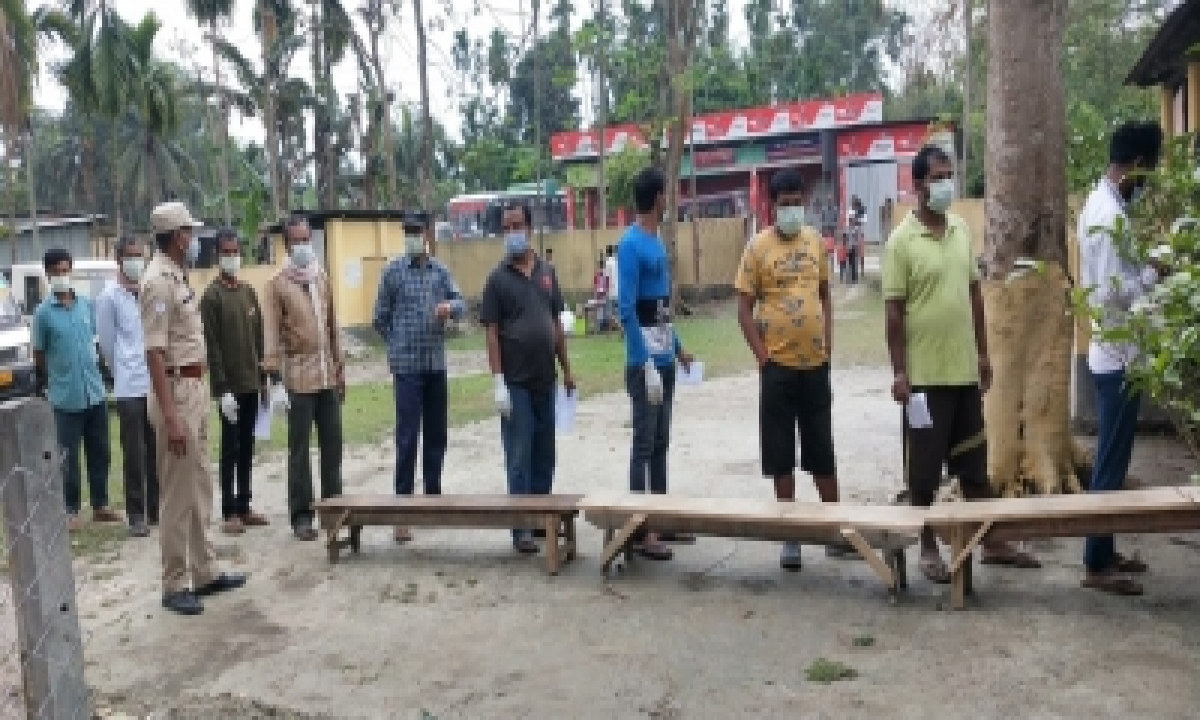Guwahati, April 6 : Tuesday’s third and final phase of polling in 40 of the 126-member Assam Assembly is a litmus test for both the ruling BJP-led alliance and the opposition Congress-led ‘Mahajot’ (grand alliance).
Of the 40 Assembly segments, bordering Bhutan, West Bengal and Arunachal Pradesh, at least 13 seats are Muslim majority, six reserved for the tribals and two reserved for the people belonging to the scheduled caste.
Tuesday’s electoral battle in 12 districts, according to the political experts, would be decisive for the ruling Bharatiya Janata Party (BJP) and the main opposition Congress as both the parties had won 11 seats each in the 2016 Assembly polls.
The BJP’s old ally Asom Gana Parishad (AGP) in the last Assembly polls bagged four seats while the Bodoland People’s Front (BPF) and the All India United Democratic Front (AIUDF) had secured eight and six seats respectively.
Both the BPF and the AIUDF this time are allies of the Congress-led ‘Mahajot’.
In the 2016 elections, the tribal based BPF with its political base mostly in western Assam was with the BJP and the AIUDF, a Muslim based party, fought the polls separately.
After the Bodoland Territorial Council polls in December last year, the BJP had forged an alliance with the United People’s Party Liberal (UPPL) and the Gana Suraksha Party (GSP), both have bases among the indigenous people, discarding its old ally BPF, which had three ministers since the Chief Minister Sarbananda Sonowal-led BJP dominated government came to power in 2016.The AGP remains an ally this time too.
Besides the BPF and the AIUDF, seven other allies of the Congress led 10-party ‘Mahajot’ are, three Left parties — the CPI-M, the CPI and the CPI-ML, the Anchalik Gana Morcha, Athe Rashtriya Janata Dal and two community-based parties — the Jimochayan (Deori) People’s Party and the Adivasi National Party.
The Tuesday’s polling would also decide the political fate of BJP’s points man and Finance, Health, Education, PWD Minister Himanta Biswa Sarma and ruling party’s state President Ranjeet Kumar Dass.
Sarma, the convener of the BJP backed anti-Congress body — North East Democratic Alliance, is contesting from the Jalukbari seat from where he has consecutively won since 2001 while Dass is contesting from Patacharkuchi seat.In the last elections in 2016, he was elected to the assembly from the Sorbhog constituency.
The Congress this time has fielded a total of 95 candidates and the BJP has put up 93 candidates, allotting the remaining seats to their allies.
Out of the 40 seats, the 13 Muslim majority seats are Mankachar (Muslims 88.70 per cent), Salmara South (98.20 per cent), Dhubri (65.43 per cent), Gauripur (51.84 per cent), Bilasipara East (74.25 per cent), Abhayapuri North (51.36 per cent), Goalpara West (56.10 per cent), Jaleswar (83.13 per cent), Barpeta (51.73 per cent), Jania (92.83 per cent), Baghbar (95.57 per cent), Sarukhetri (56.52 per cent) and Chenga (92.83 per cent).
According to Census 2011, Muslims account for 34.22 per cent in the entire state, while Hindus and other religions account for the rest of the 3.12 crore total population of Assam.Of the 126 assembly seats, religious minorities decide the electoral fate in 23 seats, mostly in western and southern Assam and play a crucial role in about seven more Assembly seats in different districts.
Of Assam’s 34 districts, 12 per cent or more Muslim population resides in 19 districts and in nine districts (out of 19 districts) the Muslim population constitutes 50 per cent or more.
In this year’s election, the BJP has put up eight Muslim candidates while the Congress has fielded 17 Muslim nominees.
Political commentator Sushanta Talukdar said that considering the sentiments of the Assamese and sensitivity of the contentious Citizenship (Amendment) Act, the BJP has remained cautious and is making statements on a careful note to avoid the split of its votes in the elections.
“Illegal migration is a key issue in Assam for the past many decades and obviously before every election, this becomes a main issue for all the political parties,” Talukdar told IANS.
During the month-long election campaign Prime Minister Narendra Modi, Union Home Minister Amit Shah, BJP President J.P.Nadda, Union Agriculture Minister Narendra Singh Tomar, Defence Minister Rajnath Singh, Uttar Pradesh Chief Minister Yogi Adityanath and his Madhya Pradesh counterpart Shivraj Singh Chouhan and all other BJP leaders and central ministers made accusing the AIUDF and its chief perfume baron Badruddin Ajmal alleged that the party has been “patronising illegal migrations into Assam”.
The BJP also criticised the Congress for “aligning with the inimical forces”.
The Congress, the AIUDF leaders including Ajmal, a Lok Sabha Member, denying the BJP’s accusations, said the saffron party has been spreading “hatred across the country”.
The final phase of Assembly elections on Tuesday would decide the electoral fate of 337 candidates including 25 women aspirants.
Assam Chief Electoral Officer Nitin Khade said that all necessary steps have been taken to conduct free, fair, peaceful and smooth elections on Tuesday, when 79,19,641 voters including 39,07,963 women electorates are eligible to cast their votes across 9,587 polling stations in 6,107 locations.
Of the 9,587 polling stations, 316 are all women managed polling stations.
Khade told the media that around 32,000 Central Armed Police Forces, along with thousands of state security force personnel, have been deployed to maintain law and order during this phase in which 45,604 polling personnel were engaged to conduct the polls
.






